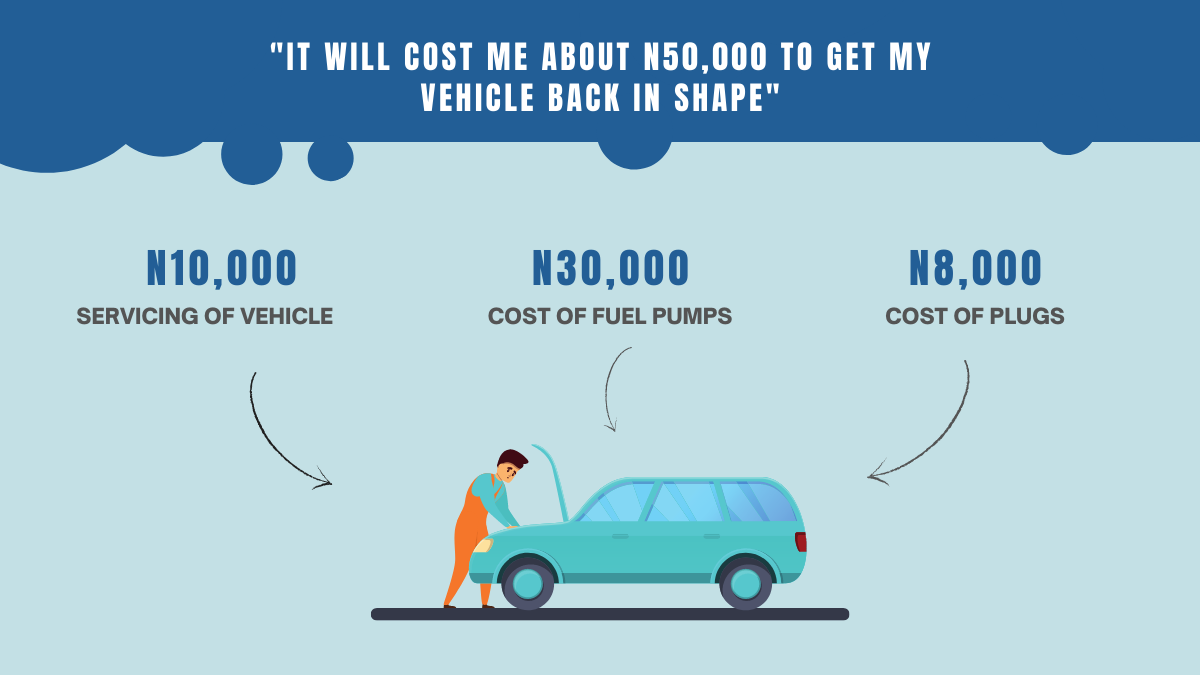The Godwin family, residing in Abuja, is currently facing one of the worst effects of contaminated fuel recently sold in some filling stations in the federal capital territory. Three out of their four cars are currently damaged due to the effect of the coffee-brown coloured fuel they bought for their cars from different filling stations in Abuja recently.
‘I noticed that all the fuel in the cars had the same colour, which was coffee-brown. The top was looking like water and the bottom like fuel’, Promise Godwin, the family patriarch said, describing the fuel he, his uncle, and mum bought for their cars.
The first purchase was on Friday, 4th February. Mr John Godwin, Mr Godwin’s uncle purchased some litres of fuel at the Total filling station in Berger Roundabout. A few minutes after the purchase, Mr John said he noticed the car made a sudden quick thrust (a jerk) but he was able to drive it home. The next day, the Toyota Camry refused to start.
The same day, Mr Godwin received a call from his mother laying the same complaint. She purchased fuel for her Toyota CRV at a filling station she can’t recall its name in Mararaba, outskirt of Abuja. Her car, which stopped in the middle of the road, had to be towed home.
On the 10th of February, his brother, Paul Godwin, got fuel from A. A. Rano filling station along Mararaba road. After the top-up, the car that was functioning properly started jerking. His brother called to relay the scenario and was told to manage the car home, which he did.
‘Now it’s only my car that’s functioning as I got my fuel from black market sellers close to the house. Currently, all the cars are parked at home pending when the government will clear up the bad fuel, then we will think of how to fix the cars and put them to use again,’ Mr Godwin said.
Commenting on the damages to the Godwin’s vehicles, Engr. Igbe Bestor, an auto mechanic said the vehicles’ fuel pumps and nozzles have been damaged and this hinders the pump of fuel to the engine. Furthermore, he noted the plugs are affected which makes it impossible for the vehicles to start.
‘On the average, it will cost them N50, 000 to get each vehicle running again. They have to get new fuel pumps which cost N25,000 to N30,000, then plugs at an average price of N8,000. The servicing of the vehicle will cost N5,000 to N10,000’, he said.

The experience was the same for Adams Oche, another resident of Abuja. When his car started jerking after he purchased fuel recently, he had to visit the mechanic to ascertain the problem. There he was told the fuel pumps had been damaged due to contaminated fuel used for the car.
‘I spent N14,000 to replace my damaged fuel pumps’, Mr Adams said adding that the cost of repair was that low because he discovered the issue on time.
The Poison in the Fuel
The damages experienced by the Godwin’s family, Mr Adams Oche and many other residents of Abuja were a result of the presence of methanol (sulphur) in the fuel in more than the required quantity. Recently, Nigeria took a consignment of ‘bad fuel’ laced with methanol in more than required quantity.
The Nigeria National Petroleum Corporation (NNPC) blamed four oil companies for importing the bad fuel into the country. However, these companies have vehemently denied allegations and collectively pointed their fingers back at the NNPC.
Methanol affects the smooth functioning of the vehicles, causing damages by wearing metallic surfaces it comes in contact with.
Methanol (sulphur) is a regular content in fuel which quantity is expected to be reduced to the required quantity for health and safety.
Thus, the Standard Organisation of Nigeria (SON) set a sulphur content of 150 parts per million (PPM) in petroleum products imported into the country.
However, the regulators of the downstream sector in the African continent, the African
Refiners and Distributors Association (ARA), adopted the AFRI Clean Fuel Specification. AFRI 5 recommends a sulphuric content in the fuel of 50ppm by 2025. With the target of achieving a 10ppm sulphur content by 2030 across the continent.
Nigeria’s 150ppm is way higher than Europe’s and America’s standard of 10ppm.
Records show that this is not the first time bad petroleum products, especially fuel, have been imported into the country.
In 2018, the country imported fuel that far exceeded the standard set by SON. Fuel imported into the country contained 860ppm. The fuel imported into the country contained 5.7 times the sulphur per SON’s recommendation and 86 times above Europe’s standard.
Damages to Vehicles and Lives
Engr. Bestor, said methanol is an addition in gasoline engines that have been proven to increase the octane value and will cause a decrease in hydrocarbon toxicity, and carbon monoxide emissions when mixed in moderation. Most modern fuel systems designed with feedback control should accommodate low-level methanol blends (up to 10%) without difficulty.
He said a high volume of methanol in fuel that includes increased vapor (water pressure resulting in fuel pump damages; causing cracks in the components of the engine that causes it to leak or become permeable to fuel; affects the drivability, acceleration, and fuel economy of the vehicle; and increases carbon monoxide emission.
‘Within the last two weeks at my workshop, we have seen adverse effects ranging from engine misfiring, engine start-ability malfunction, damaged fuel pumps and injector nozzles, engine acceleration hesitation and stalling,’ Mr Bestor said.
Another auto mechanic, Adakole Okochi, said fuel with high methanol causes significant damage to vehicles.‘They will need to drop the fuel tank, wash thoroughly with thinner, and install back. Then your fuel pump and gauges will have to be cleaned too. Next are your nozzles, and finally, your spark plugs may be replaced, he said.
However, the effect on vehicles is not the only concern. The use of fuel with high methanol content increases greenhouse gas emissions. Mr Bestor pointed out that excess methanol will have a high carbon monoxide emission which causes damage to the ozone layer.
The combustion of methanol in vehicles increases air pollution. Sulphur has been proven to be 23,000 times more potent than carbon dioxide, thus increasing global warming through greenhouse gas emissions.
While the country fights to reduce greenhouse gas emissions from carbon, methanol is multiple times greater than carbon. The sulphur content in fuel thus threatens the country’s effort to reduce greenhouse emissions.
Where the Fault Lies
Nigeria chose the post-shipment inspection of goods into the country for a pre-shipment inspection. This means that the authorities will not inspect goods before they come in but after.
Inspection of petroleum products for methanol content at the point of purchase before import was waived for an inspection after arrival in the country.
Furthermore, the Petroleum Products Pricing Regulatory Agency (PPPRA), which gives licence for importation of petroleum explained its inspection process which involves noting imported volume at the port, discharged volume, and daily opening and closing stock enforcement.
There was no stipulation as to testing to ascertain the state of the product, clean or not. Thus, a bad petroleum product can easily find its way into the market without notice due to a failure of regulatory procedures.
Mrs Oyinda Adedokun, an oil and gas expert attributed this issue to the monopolistic nature of NNPC. The systemic and regularory checks and balances have been removed.
She said, ‘there was a section in DPR responsible for quality checks on PMS which was transferred to the government based on the new Act. It seems obvious now because we all feel it. Another huge part of the removal of checks and balances is the high consumption quantities. No one is checking anything’.
This story was published with funding support from the Centre for Journalism Innovation and Development.



